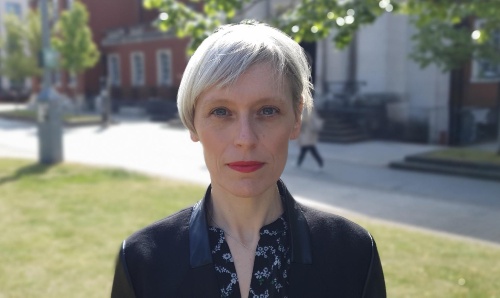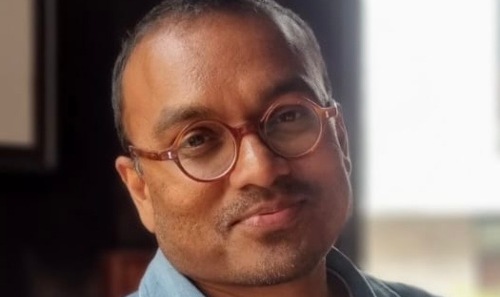About the network
This network aims to develop critical innovations in the study of fear through an international and interdisciplinary research group that brings together doctoral candidates, early-career researchers, and mid-career and senior scholars interested in the politics, feelings, and practices that converge around fear from historical and contemporary perspectives.
.png)
Network aims
Fear is a defining emotion of our present, as experienced powerfully in the COVID-19 pandemic, contemporary wars, authoritarian regimes, populist politics, and the threats of disasters and climate change. At the same time, it stretches into the past and future.
Fear, like other emotions, has a history and a trajectory. It is in times of uncertainty and crisis that this history and future, and how it impacts people’s lives, their social conduct and their very bodies, are perhaps most acutely felt.
In that sense, fear is not simply an internalised emotion and psychological state. It has a social, cultural, and political life. It shapes and is shaped by social relations, power structures and human-environment relations.
The network participants are interested in exploring what “fear does” and how particular contexts and practices shape emotional practices, rather than in defining what fear is.
Some of the questions that the researchers involved in the network address include:
- What kinds of new identification and belonging can fear and uncertainty produce in communities, including displaced or moving communities?
- Can fear and uncertainty strengthen emotional bonds, in addition to causing internal tensions, aggression, and community erosion and demise?
- How do cultures of fear and precarity intersect with conceptions of time (pasts, presents, and futures) to shape everyday life, including ritual and religious practice?
- How can we gather and communicate qualitative data about fear and other “negative” emotions in a way that gives expression to the experiences of community members across linguistic and cultural barriers?
Network activity
Projects and publications
- Erica Baffelli (PI) and Jane Caple (RF) Fear and Belonging in Minority Buddhist Communities Leverhulme Trust Research Project (RPG-2023-030) 2023-2027
- Ioannis Gaitanidis (PI) "Religion" and "Fear" in Contemporary Japanese Consumer Law: The Case of Legal Measures Against "Spiritual Sales". Grant-in Aid for Scientific Research(C) (25K03582) 2025-2028
- Sébastien Bachelet (PI) ESRC-funded project “Acts/Crimes of Solidarity: an ethnographic study of illegalisation and criminalisation amongst pro-migration activists and other citizens”. ESRC Research Grant (ES/T016485/1, 2021-2024)
- Dragons – research and performance project with Theatre Senza (Tunis, 2017) (video)
- Bachelet, Sébastien. 2025. The Adventure: Violent borders, illegal migration, and the uncertain quest for life in Morocco. Manchester University Press.
- Hagan, Maria and Sébastien Bachelet. 2024. “Insidious Harassment: Criminalisation, Solidarity, and Migration in France and Morocco.” Antipode, 56: 1308-1328.
- Baffelli, Erica. 2023. “Fear and the construction of minority religions in Japan.” Religion, State and Society 51 (3): 223-237
- Baffelli, Erica. 2022. “Living Aum: Austerities, Emotion, and the Feeling Community of Former Aum Shinrikyō Member.” Nova Religio 25 (3): 7–31.
- Gaitanidis, Ioannis. 2024. “The Co-constitution of Bad Religion and Unethical Sales: Fear at the Heart of Japan’s ‘Spiritual Sales’.” Implicit Religion 25 (3-4): 337-353.
- Graf, Tim. 2021 “Japanese Temple Buddhism during COVID-19.” Bulletin of the Nanzan Institute for Religion and Culture 45: 21–47.
- Majeed, Raamy. 2025. “National Humiliation: Emotion, Narrative, and Conflict.” Journal of Applied Philosophy 42 (1): 287-302.
- Majeed, Raamy. 2020. “The new LeDoux: Survival circuits and the surplus meaning of ‘fear’.” The Philosophical Quarterly 70 (281): 809-829.
- McLaughlin, Levi. Forthcoming. 2025. "Perennial Fears, Novel Responses: The Unification Church in Japan after the Abe Assassination." In Pekkanen, Robert J., Kenneth McElwain, and Daniel M. Smith, eds. Japan Decides 2025: The Japanese Lower House Election. Palgrave Macmillan.
- Schröer, Frederik. 2024. “Affective Entanglements: Human-Nonhuman Relations in Buddhist Ecologies of Feeling” Journal of Global Buddhism 25 (1): 1-17.
- Schröer, Frederik and Laura Otis. 2024. “Feeling Environments: Emotions Beyond Human Interiority” Geschichte und Gesellschaft 49, (1): 138-58.
- Fischer, Djio Juliette, Frederik Schröer, Saskia Denecke, Lawrence Murphy, and Simone Kühn. 2024. “Are We Afraid of the Woods? An Investigation of the Implicit and Explicit Fear Reactions to Forests.” Environmental Research 260: 119573.
- Zagaria, Valentina. 2019. “The Morally Fraught Harga: Migration Blame Games in a Tunisian Border Town.” The Cambridge Journal of Anthropology 37 (2): 57-73.
- Watanabe, Chika. Forthcoming. Play to Survive: Disaster Preparedness along the Ring of Fire. Stanford University Press.
Network events
FeRN seminar
- Linda Zampol D’Ortia (Ca’ Foscari University of Venice)
- 4 March 2026, 10am
- Event link
- "Harsh Truths and Mistaken Vows: The Ugly Side of Buddhist Charisma"
- This talk considers the rarity of mentions of fear in the literature composed by the Catholic missionaries of the Society of Jesus from Japan, in the sixteenth and early seventeenth centuries. The mission, founded by future saint Francis Xavier in 1549, by the 1580s made accommodation to Japanese culture one of its policy tenets and based much of its work of evangelisation on emotional practices. However, the emotion of fear, which had a complex status both in Catholicism in general and in its specific Jesuit expression, was very rarely mentioned in the many letters sent from the archipelago and in the mission’s histories.
A similar absence, moreover, marked spiritual texts translated into Japanese for the use of the local Catholic communities. I suggest that, far from being absent, fear was implied in Jesuit correspondence as part of the emotional sequence of consolation, and thus never mentioned explicitly. At the same time, as European spiritual literature was accommodated to Japan, a further step of distancing from fear was taken through specific strategies of translation of consolation itself. These processes help unveiling the complex tensions that surrounded the emotion of fear in early modern Catholicism, both in Europe and in Japan.
- This talk considers the rarity of mentions of fear in the literature composed by the Catholic missionaries of the Society of Jesus from Japan, in the sixteenth and early seventeenth centuries. The mission, founded by future saint Francis Xavier in 1549, by the 1580s made accommodation to Japanese culture one of its policy tenets and based much of its work of evangelisation on emotional practices. However, the emotion of fear, which had a complex status both in Catholicism in general and in its specific Jesuit expression, was very rarely mentioned in the many letters sent from the archipelago and in the mission’s histories.
FeRN seminar
- Chigusa Yamaura (University of Oxford)
- 25 March 2026, 4pm
- Location: Sam Alex_A202
- "The Fear of a Shrinking Nation: Chronologies of the Future and the Collapse of Everyday Life in Japan"
- The fear that the nation is shrinking, potentially into oblivion, prevails in contemporary Japan. Every year, stories about record-low fertility rates and population decline circulate widely in Japanese society. Such narratives sometimes go so far as to predict the disappearance of the Japanese ethnic group itself. How can we understand this fear of a gloomy national future?
This presentation argues that narratives of population decline function as a new form of nationalism. By examining a new genre of book, the Chronology of the National Future series, I show how imagining and constructing scenarios of a potential dystopian future provokes a timeless sense of national belonging, encompassing not only the past and the present, but also the future.
The Chronology of the Future series illustrates how population decline is projected to lead to disastrous consequences for the everyday lives of Japanese citizens, presented year by year. These imagined outcomes include, for instance, the dysfunction of public transportation systems and the collapse of emergency medical services. At the same time, this presentation considers whether such fear actually mobilises Japanese nationals.
Despite the widespread sense of urgency and crisis-ness surrounding population decline, concrete and practical actions to alter the nation’s future seem to remain limited. In this context, what does this pervasive feeling of fear ultimately lead to?
- The fear that the nation is shrinking, potentially into oblivion, prevails in contemporary Japan. Every year, stories about record-low fertility rates and population decline circulate widely in Japanese society. Such narratives sometimes go so far as to predict the disappearance of the Japanese ethnic group itself. How can we understand this fear of a gloomy national future?
- FeRN seminar. Raamy Majeed (The University of Manchester)
“Humiliation Narratives and the Politics of Fear".
December 9, 2025. - FeRN seminar. Sara Swenson (Dartmouth College)
“Harsh Truths and Mistaken Vows: The Ugly Side of Buddhist Charisma".
October 16, 2025. - FeRN workshop (in collaboration with Centre for Contemporary Buddhist Studies, University of Copenhagen).
“Ethnographies of ‘negative’ emotions and affective atmospheres.”
June 3-4, 2025. - FeRN Seminar. Valentina Zagaria (The University of Manchester)
“The harga is the women’s fault’: Fearing migration’s revolutionary potential in a Tunisian border town".
April 2, 2025. - FeRN Seminar. Ran Zwigenberg (Penn State)
"Nuclear Minds: Anxiety and Transformation in A-bomb psychology.”
March 5, 2025. - FeRN and Centre for Robotics and AI Symposium (funded by Japan Society for the Promotion of Science).
“Robotics, Religion and Ethics.”
February 28, 2025. - FeRN and Affective Artefacts Collective seminar. Erica Baffelli (The University of Manchester) Zhaokun Xin (The University of Manchester) Jane Caple (The University of Manchester) Frederik Schröer (Freie Universität, Berlin)
“Feeling With the Trouble: Affective Entanglements In and Beyond the Human.”
February 26, 2025. - FeRN Seminar. Marius Palz (Nissan Institute, University of Oxford)
"Welcome to the Sacrifice Zone(s): Fear and Militarism in Okinawa."
December 5, 2024. - FeRN Seminar. Ioannis Gaitanidis (Chiba University)
“Fear, Legal Victimhood and ‘Fraudulent’ Religion in Contemporary Japan.”
July 11, 2024.
People and partners
Partners
- The University of Manchester (School of Arts, Languages and Cultures and School of Social Sciences)
- University of Oslo (Department of Culture, Religion, Asian and Middle Eastern Studies)
- University of Copenhagen (Department of Cross-Cultural and Regional Studies)
Steering group

Erica Baffelli (Department of Modern Languages and Cultures, The University of Manchester)
Erica Baffelli is Professor of Japanese Studies at The University of Manchester (UK). Her recent research projects focused on religion in contemporary Japan, religion and media, new and minority religions, religion, gender and violence, and Buddhism and emotions.
She currently PI on a Leverhulme Research Project on "Fear and Belonging in Minority Buddhist Communities" (RPG-2023-030, 2023-2027).
.jpg)
Trine Brox (Centre for Contemporary Buddhist Studies, Department of Cross-Cultural and Regional Studies, University of Copenhagen)
Trine Brox is Associate Professor at the Department of Cross-Cultural and Regional Studies, University of Copenhagen, Denmark. She has written extensively about Tibetan worlds, specialising in contemporary Tibetan Buddhism, and is currently PI of the international, collaborative project WASTE: Consumption and Buddhism in the age of garbage.
.jpg)
Jane Caple (Department of Modern Languages and Cultures, The University of Manchester)
Jane Caple is a Research Fellow at The University of Manchester. Her research focuses on intersections between religion, economy, morality, and emotion in contemporary Tibetan communities. Her current research project is Fear and Belonging in Minority Buddhist Communities (Leverhulme Trust RPG-2023-030).
.jpg)
Aike Rots (Department of Culture, Religion, Asian and Middle Eastern Studies, University of Oslo)
Aike Rots is Professor of East Asian Religions at the University of Oslo. He is the author of Shinto, Nature and Ideology in Contemporary Japan: Making Sacred Forests (2017) and co-editor of Water Powers: Sacred Aquatic Animals of the Asia-Pacific (2026), among other publications. He is currently working on two books on ritual, emotions, and natural environments.
.jpg)
Frederik Schröer (Freie Universität, Berlin)
Frederik Schröer is a global historian of 19th and 20th-century South Asia and Tibet. His work focuses on emotions in Buddhism, migration/diaspora, and environmental history. His current research traces human-environment relations among Buddhist reformers in colonial India. He is an editor of Contributions to the History of Concepts [berghahnjournals.com].
.jpg)
Chika Watanabe (Department of Social Anthropology, The University of Manchester)
Chika Watanabe is Senior Lecturer in Social Anthropology at The University of Manchester. Her research examines disaster preparedness and the role of play, intergenerational relations, and memory. She is the author of the forthcoming book, Play to Survive: Disaster Preparedness along the Ring of Fire.
Network members
.jpg)
Sébastien Bachelet (Department of Social Anthropology, The University of Manchester)
Sébastien Bachelet is a Senior Lecturer in Social Anthropology. His research interests include illegality, (forced) migration, advocacy, political subjectivity, imaginaries, hopes, uncertainty, criminalisation, participatory and creative/visual methods with a focus on the Maghreb (especially Morocco) and France.

Maria Elena Bedoya Hidalgo (Department of Modern Languages and Cultures, The University of Manchester)
María Elena Bedoya is an Ecuadorian historian and curator based in Madrid. She specialises in public history, visual culture, and critical museology in Latin America from an intersectional perspective. Her work explores race, fear, and emotions through creative research formats. She is Honorary Research Associate at The University of Manchester.
.jpg)
Ioannis Gaitanidis (Graduate School of Global and Transdisciplinary Studies, Chiba University)
Ioannis Gaitanidis is an Associate Professor at the Graduate School of Global and Transdisciplinary Studies, Chiba University (Japan). He is the author of Spirituality and Alternativity in Contemporary Japan (2022) and co-editor of Teaching Japan: A Handbook (2024) and of Therapy, Spirituality, and East Asian Imaginaries (2025).
.jpg)
Tim Graf (School of International Studies in Japan, Kanazawa University)
Tim Graf is an Assistant Professor at Kanazawa University’s School of International Studies in Japan. His research interests focus on ways that fear is negotiated in contemporary Japanese Buddhist practices designed to mitigate disasters and crises, and more broadly deal with the interplay of religious practice and modern social change.
.jpg)
Paulina Kolata (Department of East Asian Languages and Civilizations, Harvard University)
Paulina Kolata is an Assistant Professor of East Asian Languages and Civilizations at Harvard University. She is a scholar of Buddhism in Japan, material and economic practices, and the environmental impacts of religious life under demographic change. She has conducted ethnographic work on waste-making, material abandonment, and ecological precarity.

Raamy Majeed (Department of Philosophy, The University of Manchester)
Raamy Majeed is a Lecturer in Philosophy at The University of Manchester and an Associate Editor of the Australasian Journal of Philosophy. He works primarily on the philosophy of emotion but has also published in the philosophy of mind, metaphysics, aesthetics, and the philosophy of race.
.jpg)
Levi McLaughlin (Department of Philosophy and Religious Studies, North Carolina State University)
Levi McLaughlin is Professor at the Department of Philosophy and Religious Studies, North Carolina State University. He is co-author of Kōmeitō: Politics and Religion in Japan (2014) and author of Soka Gakkai’s Human Revolution: The Rise of a Mimetic Nation in Modern Japan (2019; in Japanese 2024), as well as other publications.
.jpg)
Zhaokun Xin (Department of Modern Languages and Cultures, The University of Manchester)
Zhaokun Xin is Lecturer in Chinese Studies at The University of Manchester. His research engages late imperial Chinese literature in conversation with the interdisciplinary fields of affect and gender studies, ritual theory, and medical humanities. His current project is tentatively titled The Uses of Anger in Late Imperial Chinese Literature.
.jpg)
Valentina Zagaria (Department of Social Anthropology, The University of Manchester)
Valentina Zagaria is an ethnographer of borders, migration, and social movements in North Africa, currently holding a Leverhulme Research Fellowship at The University of Manchester. Her work focuses on dignity as a drive of both protest and migratory movements in the region. She is interested in experimenting with performance and collaborative methods.
.jpg)
Linda Zampol D’Ortia (Department of Asian and North African Studies, Ca’ Foscari University of Venice)
Linda Zampol D’Ortia is Young Researcher MSCA Fellow at Ca’ Foscari University of Venice with the project “Emotional Practices, Power Relations, and Asymmetrical Dependencies in Catholic Missions (1549-1700).” Her research interests include global Christianity, early modern Catholic missions, history of emotions, and material history.
